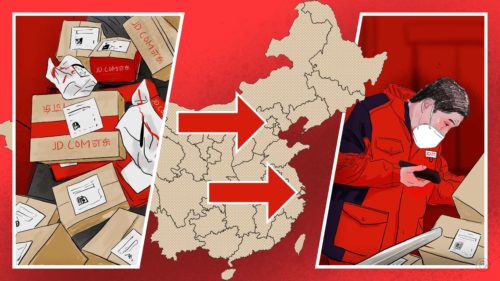Australia-China relations head to new low
The Chinese ambassador to Australia, Chéng Jìngyè 成竞业, in an interview published by the Australian Financial Review on April 26, suggested that Chinese tourists, students, and consumers may boycott Australia if Morrison’s government continued to pursue the “dangerous” idea of an international inquiry.
On April 17, Australian home affairs minister Peter Dutton called for transparency from China about the origins of the coronavirus. “I think it is incumbent upon China to answer those questions and provide the information, so that people can have clarity about exactly what happened because we don’t want it to be repeated,” he said, per the Australian ABC.
His statement closely mirrored the calls for transparency that other officials in countries including Britain, France, Germany, and the United States have issued in recent weeks. China has pushed back against all those calls, but singled out Dutton for criticism. “Obviously he must have also received some instructions from Washington requiring him to cooperate with the U.S. in its propaganda war against China,” a spokesperson for the Chinese embassy in Canberra said on April 21.
Then the Australian government went further, with Prime Minister Scott Morrison proposing a “three-point plan” to reform the World Health Organization, and calling up leaders in the U.S., France, Germany, and New Zealand. The Guardian reported on April 22 that “so far there has been interest in the ideas but no declarations of support” for Morrison’s proposal, whose three points are:
- “reform of the governance of the WHO, with one element being removing the right of individual members to veto proposed health strategies”
- “an independent review organization which would examine the performance of the WHO in a global health calamity”
- “to give the WHO the power to send a team of investigators into a country to determine the factors behind a disease outbreak.”
The third point, which would mean sending international investigators into China to investigate how the COVID-19 outbreak began, has raised hackles in Beijing. A war of words has rapidly intensified in the past couple of days:
The Chinese ambassador to Australia, Chéng Jìngyè 成竞业, in an interview published by the Australian Financial Review on April 26, suggested that Chinese tourists, students, and consumers may boycott Australia if Morrison’s government continued to pursue the “dangerous” idea of an international inquiry. Australian Foreign Minister Marise Payne denounced this line as attempted “economic coercion.”
Now Chinese state media is in full attack mode. The Australian Financial Review reports:
The Communist Party’s mouthpiece, the People’s Daily, published a comment piece on Tuesday accusing Australian politicians of pandering to the United States and said the push for a global investigation would fail.
The strongly worded article in the newspaper [in Chinese]…noted domestic criticism of Scott Morrison’s leadership after the bushfires and 780,000 job losses in Australia from mid-March to early April.
“The deeply troubled Morrison government is anxious to find an outlet for the domestic public’s anger,” the article, which appeared in the newspaper’s overseas edition, said…
“Australia is trying to please the United States and be a bully in the region.”
It was the first time China has directly criticised Mr Morrison or his handling of the outbreak, a tactic it has deployed against the United States and some other countries…
While other publications in China regularly publish negative stories about Australia, it was the first time the People’s Daily has directly criticised Canberra since 2018 when relations soured under the Turnbull government. A separate article also lashed out at The Daily Telegraph’s use of China’s national emblem to link it with coronavirus.
Naturally, the mouth-frothing editor of the Global Times, Hú Xījìn 胡锡进, has added his voice to the nationalistic fervor. In a Weibo post (in Chinese), he likened Australia to “chewed gum on the bottom of a shoe” (鞋底上的嚼过的口香糖 xiédǐ shàng de jiáoguò de kǒuxiāngtáng), and predicted that Australia-China relations were likely to plunge just like U.S.-China relations have in recent years.
Interestingly enough, this isn’t the first time that the Global Times has compared Australia to gum trodden underfoot. In December 2017, as China denounced Australia’s alarm over foreign influence operations, a Global Times editorial (in Chinese) said that Australia was like “gum stuck on the soles of China’s feet” (粘在中国脚底的口香糖了 zhān zài zhōngguó jiǎodǐ de kǒuxiāngtáng le).
More on current Australia-China relations:
- Australia calls China’s envoy over ‘disappointing’ remarks / SCMP
- China threatens to stop Australian imports / Australian Associated Press
- Escalating China-Australia tensions over calls for pandemic origin investigation / ABC Radio
A seven-minute interview with the scholar Richard McGregor. See also his op-ed in the Guardian yesterday: In a testy post-Covid-19 world, Chinese sanctions of Australian goods may be closer than ever. - Sky News Australia reporter Trudy McIntosh on Twitter: “Chinese Ambassador to Australia has released [a] statement after phone call with DFAT Secretary…DFAT hits back by NOT hitting back at China – in a statement says it ‘won’t respond by itself breaching long standing diplomatic protocols’”






